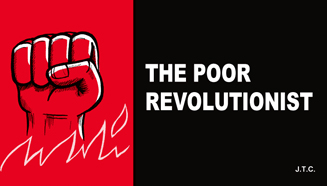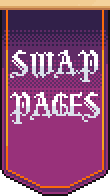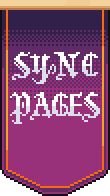Chick Tract #019 - The Poor Revolutionist (1971)
"A story of revolution and betrayal shows us that Jesus is the real answer for those who want change."
 Characteristics ⇑ ⇓
Characteristics ⇑ ⇓ 
| Editions / Variants | ||
|---|---|---|
| Nickname | "Volunteers" | "Catholic" |
| Pub Year | 1972 | 2010 |
| BUCINS | CHICK.019.1972.## | CHICK.019.2010.## |
| Fowler Code | PORR | PORR |
| Print Code | #65 | #65 |
| Cover Color | "Fire" Red | "Fire" Red |
 Plot Summary ⇑ ⇓
Plot Summary ⇑ ⇓ 
Paul leads a cell of revolutionists, dedicated to the overthrow of the government of the United States. His brother, Jimmy (a Christian), interrupts a cell meeting and preaches to the revolutionists, which results in Paul savagely beating him. He then tells Jimmy that one of the cell members, Harry, used to be a Christian but rejected it and instead became a revolutionist, due to the failures of Christianity. Jimmy explains to Paul that it is because Harry never truly repented of his sins, and therefore was never really a Christian. This upsets Harry, and Paul declares that Christianity can’t coexist with his image of a new world; both of them reiterating their intention to eliminate Christianity in their post-revolution world. Gregory is a higher up revolutionary leader. He holds a meeting of a number of cells, in which he puts forth his vision of the destruction of the current order, and that the revolutionists will be placed in positions of honor and power in their new Communist state.
In the next panel, the signal is given to start the revolution. Law enforcement offices and their families are assassinated. Fires are set and firemen responding to the fires are then assassinated as well. The authorities fight back, deploying military forces, which results in the death of. Harry, who is killed by a tank. Women and children are taken hostage by the revolutionaries and private citizens also take up the fight. Paul is shot by one of them and has a vision of his brother Jimmy telling him about Jesus’s sacrifice, but he decides to ignore it and recovers. Food is running short in supply, with politicians and enlisted men switching over to the side of the revolution, which results in the capitulation by the armed forces.
As a result of the loss of effective resistance, the revolution is successful, albeit at the cost of widespread devastation across the country. The country is overrun by foreign troops, with executions being carried out for numerous reasons, such as anyone who holds significant personal property. Jimmy is captured and is on the gallows, asking to talk to Paul. Paul decides to speak to Jimmy, who is confident that he will be with Jesus, and pleads to Paul to accept Jesus as well. Paul reacts negatively, and Jimmy is hung. Comrade Gregory asks to speak to Paul, who is confident he will be rewarded for his leadership in the revolution. Gregory informs Paul and the rest of his cell that since he was a traitor to his country, he can’t be trusted by the new regime. They are sentenced to death and immediately executed, with the realization that they were just mere cannon fodder all along. Paul is taken to judgment, subsequently not found in the Book of Life, and consigned to eternal damnation.
 Tract Contents ⇑ ⇓
Tract Contents ⇑ ⇓ 
 Characters ⇑ ⇓
Characters ⇑ ⇓ 
- Paul - The leader of a revolutionist cell.
- Jimmy - Paul’s younger brother, a Christian
- Harry - A fellow revolutionist in Paul’s cell, and a former Christian
- Gregory - A higher-level leader in the revolution who directs Paul's cell
- Unnamed Characters - Hippies (3), African-American cell member, other cell members (6), dead policeman, dead fireman, detention camp guards (2), hostages (multiple), male cell member "medic", firing squad (3), additional betrayed cell members (3), scribe angel.
 Exegesis ⇑ ⇓
Exegesis ⇑ ⇓ 
Originally released in 1972, The Poor Revolutionist reflects conservative anxiety of the societal unrest of the period A.
Internal violence within the United States has overwhelmingly been driven by the political Right. While there was violence on both sides leading up to the Civil War (see for example Bleeding Kansas), the Civil War itself, which nearly ended the United States as a country, was precipitated by the reactionary fear over the possibility of eventual Emancipation. After the war, The Ku Klux Klan and other groups used lynching and other acts of terror to keep Blacks from asserting themselves. In the Northern states, Sunset towns with accompanying acts of violence kept Blacks segregated into the inner cities. So called race riots were an excuse for reactionary Whites to massacre Blacks, usually with impunity.
Against this background, there were really only two periods in which there was significant violence precipitated by the Left. The first was in the early twentieth century and were mostly economic in nature. There was the growing unionization movement, and the First Red Scare, with some high profile bombings at the time. Herbert Hoover predicted an attempted revolution on May 1 (May Day), 1920. This did not come to pass and despite significant media attention, there was relatively little violence.
The second period was from the late sixties through the early seventies. The main drivers in this era were the Civil Rights movement entering a less passive phase, and resistance to the Vietnam War amongst the youth, especially in regards to the ‘draft’ (conscription). There were a number of instances of violence during this time. Notable examples include the 1968 Democratic National Convention protests, the Watts riots, violence associated with the Black Panther Party and the Weather Underground, and much else besides (for example, the killing of four college students in Kent State, though this was a reaction to anti-war agitation). All during this time, these actions, while involving relatively few people, received massive media attention. There was a real sense that the nation’s future was at risk by the vast majority of Americans, who were afraid of what they saw and read on TV and newspapers. However, the actual numbers of people involved in these incidents were always quite small when compared to the nation as a whole.
As a result of certain organizations touting a commitment to Christianity (such as the Klan), it can be said that a number of Christians were not concerned about violence pushed by right-wing politics being a threat to Christianity itself. This gains further credence when the Left did not have the same orientations, tending to favor atheism, which can be considered an existential threat in the eyes of heavy right-wing Christian groups.
Against this backdrop, we have tracts like The Poor Revolutionist and The Last Generation (involving a leftist dictatorship). It would be an understatement to say that the sequence of events in The Poor Revolutionist is wildly improbable. As mentioned, there were never that many leftists involved in violent activities, and contrary to the tract’s picture, they were not all that well organized. On top of this, the belief that law enforcement and the military would be so readily neutralized is fanciful in the extreme, in conjunction with the heavily armed populace. The United States has more firearms under private ownership than there are people, and gun owners are predominantly conservative (aka Right-Wing). The only part of the tract that is at all realistic is the execution of the revolutionary foot soldiers, which happened in both Communist Russia and Nazi Germany. One can also say the threat of Christian persecution in a hypothetical Communist America is not unrealistic, considering what happened in Russia and Cuba. But the base premise remains highly unrealistic.
Jack Chick cynically used the anxiety of the vast majority of Americans in this period to push an end of society and of Christianity narrative. In Chick’s view, the only person who was right in this whole story was Jimmy, who died for his faith, and achieved salvation as a result. The 2010 edition of this tract is essentially identical to the 1972 version in contextual narrative and themes, even though White supremacy is currently considered the greatest domestic terrorist threat in the United States. See also Threats to the Homeland: Evaluating the Landscape 20 Years After 9/11 — a FBI and Assessing the right-wing terror threat in the United States a year after the January 6 insurrection.
 Tract Variations
⇑
⇓
Tract Variations
⇑
⇓

Unlike tracts such as The Last Generation and The Great Escape, revisions to this tract were few and relative inconsequential. However, in addition to the conversion of hand-lettering to machine-lettering and the ablation of Grawlixes which have since been made to other works originally released during this era, there are still a number of modifications which warrant noting...
- On Page 2, the grawlix in Paul's speech is removed and the formatting is slightly altered. He changes from accusing Jimmy of "interrupting" their cell meeting to claiming he "busted" into their "private" cell meeting instead
- In Panel 3B, the slang spoken by an unknown individual in reference to Paul's beating is changed from describing it as "outta sight" to "awesome". In the dialog bubble for the singing girl with the guitar, a treble clef is replaced with two beamed eighth notes as well as an additional solitary eighth note.
- In Panel 4A, a double em-dash in Paul's speech bubble is replaced by a period. In Panel 4B, Paul goes from describing Jimmy's religion as being "a flop" to being "phony" and he goes from describing Harry pre-deconversion as a "Jesus Man" to "born again".
- On Page 5, a couple sets of em-dashes are removed and Jimmy goes from describing Harry's previous spiritual relationship as Jesus having "fellowship with him" to "dwelling" in him instead.
- In Panel 6A, Harry's grawlix is bowdlerized to "jerk", he goes from saying Christianity is "nowhere" to being "a thing of the past", and he says he "resents" Jimmy calling him filthy instead of asking how he can dare to do so. In Panel 6B, Paul goes from claiming that he is personally "building a new world" to stating that his group is collectively "creating one world government" and he goes from saying that he can't "coexist" with Jimmy to saying that "there's no room" for his kind. His grawlix is also redacted and he refers to Jimmy as a "loser". A bible reference to 1 Timothy 1:15 is added to the bottom of the panel as well, the only such reference absent from the original version.
- In Panel 7B, Paul goes from incorrectly referencing the phrase by Karl Marx that religion is the "opiate" of the masses to correcting it to the "opium" of the masses.
- In Panel 8B, "Comrade" Gregory targets "capitalistic oppression" and "police brutality" as the obstacles to overcome to usher in a "brave new world" in the 1972 edition. In the 2010 variant, he claims they must destroy the "oppressive free market system" to allow a "one new world order to rise out of its ashes". He also goes from promising Paul and his fellow revolutionists positions of power and honor in the new "communistic" world to referring to it as their "fair, tolerant socialist world". While Communism and Socialism share some ideological similarities (and are frequently conflated with one another), they are not synonyms and do represent two distinctly different schools of though.
- On Page 9, the term "liberation" force has scare quotes added to it.
- In Panel 11B, a revolutionist sporting an "afro" haircut goes from getting Paul's attention by exclaiming "Hey man" to addressing him by name.
- In Panel 12A, "Women and children" are no longer "taken hostage", but rather "Men, women and children are herded into detention camps" by the revolutionists. The concealed weapons of the civilian resistance is now explained to be "few" in number. An unidentified revolutionist has their grawlix removed when exclaiming that Paul had been hit and let's out a big "No!!!!" instead.
- In Panel 13A, while the contents of John 3:16 is present in both versions, the specific bible reference is moved from the panel's lower margin to inside of the thought bubble.
- Panel 14A is completely replaced. The early version shows a depiction of a radio station with a signal tower and mentions the "People's Liberation Army" radioing for volunteers. It also mentions the corruption and pressure put upon politicians and the eventual collapse of the armed forces. In the later edition, we see an indistinct group of revolutionist capturing a group of individuals in military uniforms bearing a white flag and the text explains that the populace had previously been disarmed and stripped of ammunition by many years of gun "regulations", subsequently leaving them defenseless against the revolutionists. Political leaders are said to "cave in to the "terrorists' demands" and it is the "nation" that proceeds to collapse. In Panel 14B, another unnamed revolutionist sloppily wearing a collared shirt and necktie goes from stating that the needed volunteers are "coming" and "pouring in" and instead says that the "land is ours" and that they had "won". Paul originally mentions the land being their's in the original version, but instead laments over "what a price we paid" in the newer edition.
- In Panel 15A, the Afro-lutionist originally states that it is "sort of strange" to see the foreign troops already being everywhere, whereas in the newer edition he asks Paul why they are "still pouring in all around" them.
- In Panel 17A, Jimmy at first extols Paul to "accept" Jesus as his "Lord and Savior', whereas in the 2010 version, he instead pleads with him to "believe" Jesus and "receive" him as his "Lord and Saviour" (emphasis added) instead, reflecting Chick's adoption of the habit of spelling the phrase with seven letters during the interim.
- In Panel 18B, the necktie revolutionist remarks to Paul that receiving their rewards from Comrade Gregory will be "outta sight". In the 2010 edition, he instead indirectly foreshadows that they will "get what [they] deserve".
- In Panel 19A, Comrade Gregory is now seen wearing a clerical "tab" collar in the 2010 variant, implying that he has been aligned with the Catholic Church all along. This is not present when he is addressing the revolutionists earlier in that same edition.
- On Page 20, an African-american revolutionist being led to their execution goes from referring to their forces as being their leader's "cannon fodder" to stating that they were "useful idiots" instead. In the 1972 edition, a footnote reference is provided to the book "I Was An NKVD Agent" B to support the claim that Communist takeovers are invariably followed by purges of their own supporters, as which took place in the Soviet Union during the later 1930's.
 Reviews and Commentaries ⇑ ⇓
Reviews and Commentaries ⇑ ⇓ 
- User Slick146 (Space Battles Forum) - https://forums.spacebattles.com/threads/lets-read-chick-tracts.525049/page-84#post-42758405
- The Bible Reloaded (YouTube Video) - https://www.youtube.com/watch?v=rCn4Wbx-XRU
 Bible References ⇑ ⇓
Bible References ⇑ ⇓ 
| 1972 Edition (6) | 2010 Edition (7) | ||
|---|---|---|---|
| Panel | Verse(s) | Panel | Verse(s) |
| 2 | 2 | ||
| 3A | 3A | ||
| 3B | 3B | ||
| 4A | 4A | ||
| 4B | 4B | ||
| 5 | 5 | ||
| 6A | 6A | ||
| 6B | 6B | 1 Timothy 1:15 | |
| 7A | Matthew 18:6 | 7A | Matthew 18:6 |
| 7B | 7B | ||
| 8A | 8A | ||
| 8B | 8B | ||
| 9 | 9 | ||
| 10A | 10A | ||
| 10B | 10B | ||
| 11A | 11A | ||
| 11B | 11B | ||
| 12A | 12A | ||
| 12B | 12B | ||
| 13A | John 3:16 | 13A | John 3:16 |
| 13B | 13B | ||
| 14A | 14A | ||
| 14B | 14B | ||
| 15A | 15A | ||
| 15B | 15B | ||
| 16A | 16A | ||
| 16B | 16B | ||
| 17A | 17A | ||
| 17B | 17B | ||
| 18A | 18A | ||
| 18B | 18B | ||
| 19A | 19A | ||
| 19B | 19B | ||
| 20 | 20 | ||
| 21A | 21A | ||
| 21B | Hebrews 9:27 | 21B | Hebrews 9:27 |
| 22A | Revelation 20:15 | 22A | Revelation 20:15 |
| 22B | Matthew 25:41 Galatians 6:7 |
22B | Matthew 25:41 Galatians 6:7 |
 Tropes and Clichés ⇑ ⇓
Tropes and Clichés ⇑ ⇓ 
 Scholarly References ⇑
Scholarly References ⇑ 
- #[A]⇑ Solicitation Letter to Federal Bureau of Investigation by Jack Chick (19 January 1971).
(https://archive.org/details/JackChick/mode/2up?view=theater) - #[B]⇑ I Was An NKVD Agent by Anatoli Granovsky (1962).
(https://search.worldcat.org/title/i-was-an-nkvd-agent-a-top-soviet-spy-tells-his-story/oclc/1748845)
















